
External Information and Communication Work: From ‘New’ thinking to ‘New’ approaches
Latest
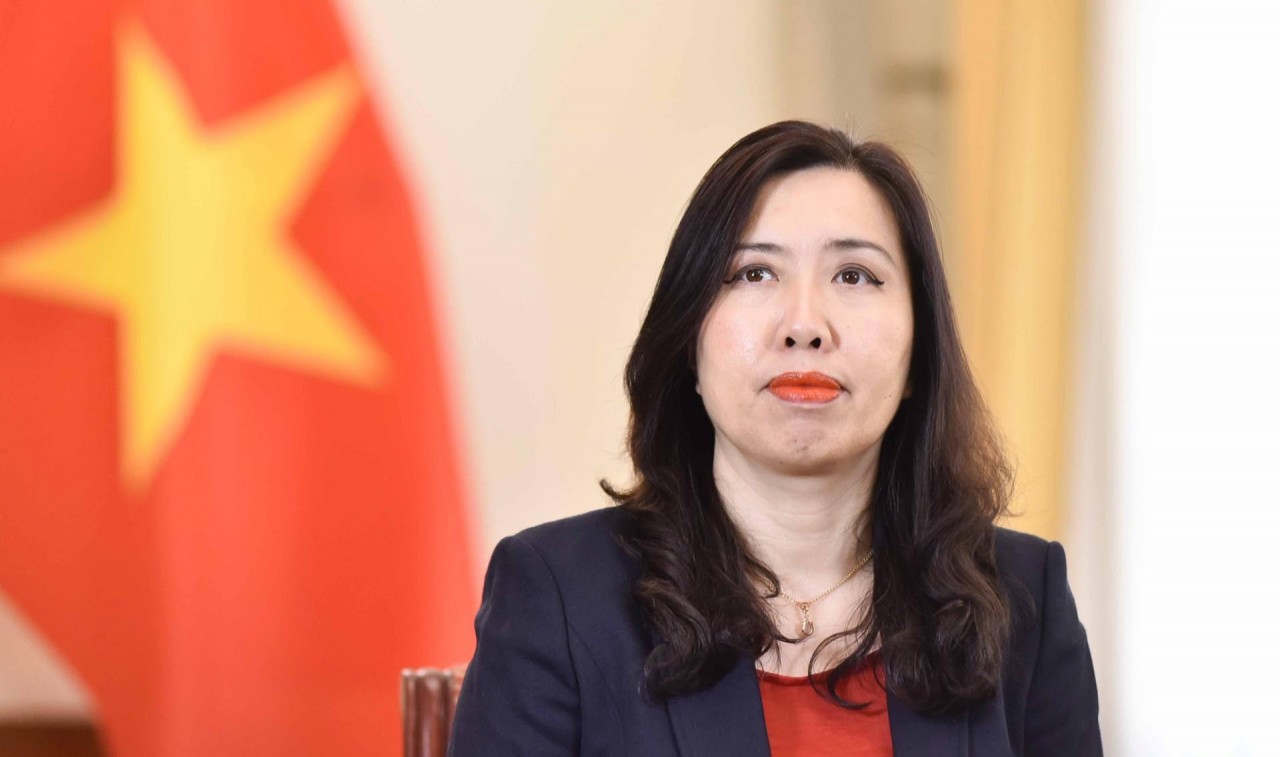 |
| External communication and information work: Deputy Minister of Foreign Affairs Le Thi Thu Hang. (Photo: Tuan Anh) |
Deputy Foreign Minister Le Thi Thu Hang stated that Resolution 47/NQ-CP focuses on many ‘new’ points in the methods to carry out external information and communication work , including ways to mobilize resources, a concern she has held for a long time.
The Deputy Minister highlighted the significance and main objectives of the Resolution 47/NQ-CP and Government’s Action Program until 2030 to implement Conclusion 57-KL/TW dated June 15, 2023, by the Politburo on improving the quality and effectiveness of external information and communication work in the new situation.
Conclusion No. 57-KL/TW inherits and supplements Conclusion No. 16-KL/TW dated February 14, 2012, by the Politburo on the Strategy for the Development of External Information and Communication Work. In the new situation, the Conclusion No. 57-KL/TW can be regarded as a 'guiding compass,' the most important directive document of the Party, carrying strategic orientation and creating a foundation for the entire political system to implement external information and communication work in the new phase, Deputy Minister Hang noted.
With the issuance of Resolution 47/NQ-CP, dated April 15, 2024, the Government aims to thoroughly convey the content of Conclusion 57-KL/TW to all ministries, ministerial-level agencies, government-affiliated agencies, and the People's Committees of provinces and centrally governed cities. This aims to create unity in thinking, cohesion in coordination, breakthroughs in methodology, innovation in content, and priority in resources so that external information and communication work can be implemented in a more comprehensive and effective manner.
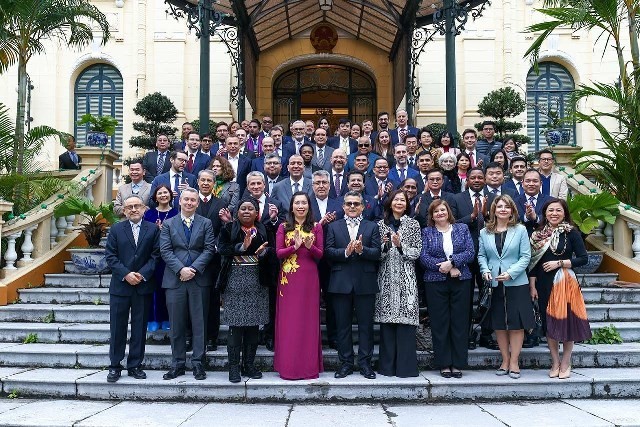 |
| External Information and Communication Work: Deputy Minister of Foreign Affairs Le Thi Thu Hang and representatives from foreign representative missions and foreign press agencies in Vietnam at the Foreign Ministry's new-year meeting in Hanoi on Jan. 2024. (Photo: Pham Hai) |
This Resolution also serves as a basis for ministries, agencies, and localities to build and improve mechanisms, policies, and organizational structures for external information and communication work, in line with their assigned functions and tasks. This fosters a close connection between external information and communication work and the political, ideological, and external affairs work of the Party and the State in particular, as well as the strategic goals and national development tasks set out by the Party's 13th National Congress in general.
The Resolution goes beyond mere orientation, outlining key tasks and solutions, including very detailed and 'new' solutions across various fields such as direction and management, content, methods, and resources. This creates a comprehensive legal framework for implementing external information and communication work at all levels. The Resolution also clearly states that external information and communication work is a political task, assigning specific responsibilities to each ministry, sector, locality, and relevant agency, emphasizing the accountability of leaders.
The Deputy Minister expressed her belief that with Conclusion 57-KL/TW and Resolution 47/NQ-CP, external information and communication work will achieve significant breakthroughs in the near future, vigorously promoting Vietnam's image to the international community, enhancing the country's position and reputation. This will make a crucial contribution to the cause of development and international integration, as well as the protection of territorial sovereignty. It will also maintain and strengthen the great national unity, garnering public support for the cause of renewal, nation-building, and defense.
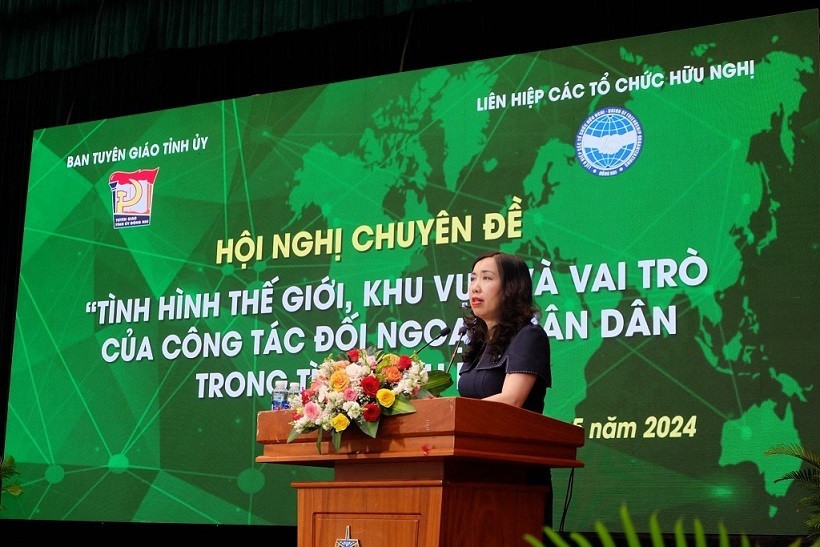 |
| External Information and Communication Work: Deputy Minister of Foreign Affairs Le Thi Thu Hang at conference on people-to-people diplomacy and external information and communication work in Dong Nai, on May 27, 2024. (Photo: Website CPV) |
Deputy Minister emphasized new approaches for external information and communication work in the context of rapid changes in media environment in Vietnam as well as in the world. The robust development and daily changes of new media, cloud computing, and artificial intelligence have transformed the ways people receive, transmit and consume information. Unpredictable and unforeseen developments in regional and global situations have contributed to profound changes in the media environment, she said.
All these factors have led to the adoption of 'new' approaches in information and communication work in general, and external information and communication work in particular. These approaches must ensure that information fully covers communication content, meets the tastes of domestic and international audiences, and is well-received while maintaining a strong stance against harmful information.
With this spirit, the Government's Action Program focuses on many 'new' aspects in the implementation methods of external information and communication work, the Deputy Minister affirmed.
Notably, the Action Program emphasizes 'applying science and technology, digital transformation to innovate external information and communication methods, creating breakthrough efficiency.' This is a particularly important directive, concretizing the contents outlined in the 13th Party Congress Resolution and Conclusion 57-KL/TW. It provides guidance and promotes faster, stronger, and more decisive digital transformation in external information and communication work, enabling the application of modern technologies not only at the central and major city levels but also in remote and rural areas. This ensures significant changes that keep pace with trends and meet the information consumption needs and preferences of people, resulting in a faster and stronger dissemination.
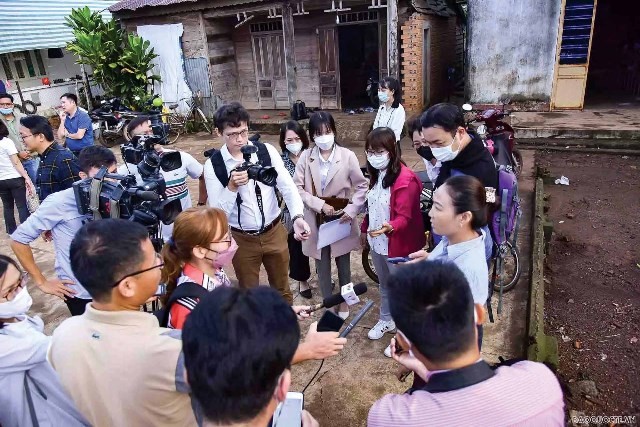 |
| External Information and Communication Work: Vietnamese and international reporters working in Dak Lak. (Photo: Nguyen Hong) |
Another 'new' point is that 'the State ensures resources, invests with focus and priority, and enhances the capacity of the specialized and key forces tasked with external information and communication work.
Compared to the contents outlined in previous relating government documents, this Action Program places much greater emphasis on the importance and methods of mobilizing resources for implementing external information and communication work. Whereas in the past, external information and communication work often faced difficulties in resource mobilization, especially when conducting information and communication activities abroad, now, with ensured resources and investment, external information and communication work is expected to carry out long-term, large-scale communication campaigns targeting various media audiences in different regions globally, the Deputy Minister noted.
Investing in human resources has long been a concern. Therefore, with this new point in the Government's Action Program, the Deputy Foreign Minister hopes that the specialized and key forces in external information and communication work will be strengthened, helping to avoid 'brain drain.'
These are just a few major points, but there are many other new aspects in the Action Program that demonstrate the comprehensive innovation in the Party and State's approach to implementing external information work in the current situation, she said.
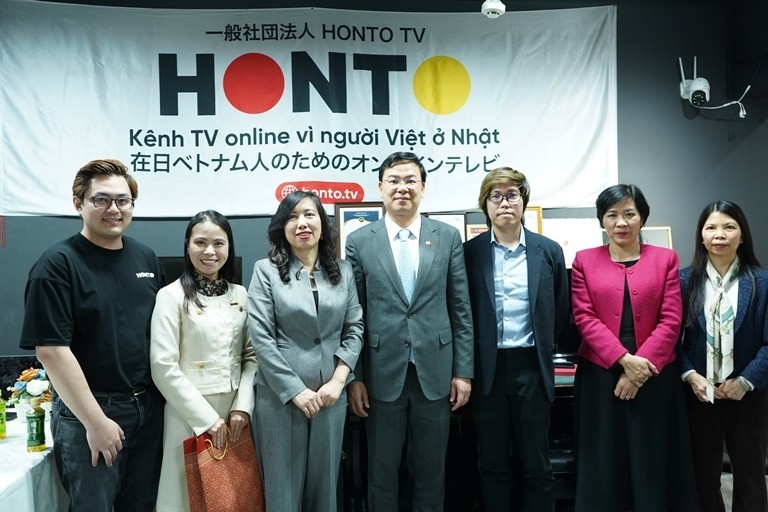 |
| External Information and Communication Work: On April, 4, 2024, in Tokyo, Deputy Minister of Foreign Affairs Le Thi Thu Hang,Vietnamese Ambassador to Japan Pham Quang Hieu visited HONTO TV - a media channel of the Vietnamese community in Japan. (Photo: Websiite CPV) |
The Deputy Minister stressed the need for new thinking to innovate external information and communication methods, as required by Resolution No. 47/NQ-CP, which calls for a fundamental shift in thinking about external information and communication work in the new phase.
To have the resources and 'new' methods, a 'new' mindset is needed. This is clearly stated in the Government's Action Program and is considered an important task and solution, she emphasized.
A shift in thinking in external information and communication work does not mean completely abandoning the old mindset, strategies, policies, and thoughts that have brought much success to external information and communication work in the past. Rather, it means honestly recognizing existing limitations and inadequacies, based on a deep study of domestic and international developments and scientific and technological advancements. “We should both inherit the achievements already made and implement new directions with a new spirit and new methods to bring greater effectiveness to external information and communication work”, Deputy Minister Hang said.
The Deputy Minister also elaborated on a number of limitations in conducting external information and communication work, which had inhibited its effectiveness in the past.
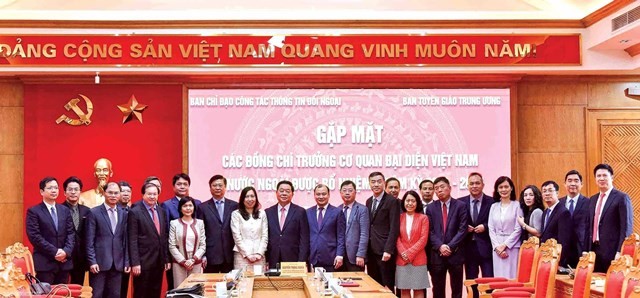 |
| External Information and Communication Work: Head of the Party Central Committee's Commission for Information and Education Nguyen Trong Nghia meets with Heads of Vietnamese representative missions for the 2024-2027 term, in Hanoi, February 2024. (Photo: Nguyen Hong) |
Taking the past experience into account, the Government's Action Program specifies breakthrough points in thinking, including:
First, it is essential to identify external information and communication work as an important component of the political, ideological, and external affairs work of the Party, state diplomacy, and people to people diplomacy; linking the implementation of external information and communication work with the strategic goals and development tasks of the country. External information and communication work needs to be on par with other diplomatic pillars, she went on.
Additionally, there must be a deep understanding of the close relationship between external and internal information and communication work. External information and communication work should not only target the international community but also aim to strengthen national unity and enhance the people's trust in the Party, the State, and the political system, she said.
Moreover, the internet should be considered one of the primary spaces for implementing external information and communication work. This work should not only be deployed through traditional media or digital content, or via first-track and second-track diplomacy in the form of leaflets, banners, posters, etc., but must also advance towards being implemented in the online environment. This involves using modern technologies to create products that are truly internet-friendly and reach internet users globally, she said. 'We should not fear being overshadowed by AI and ChatGPT, but rather thoroughly exploit and utilize them to amplify the strength of external communication and information,' the Deputy Minister emphasized.









